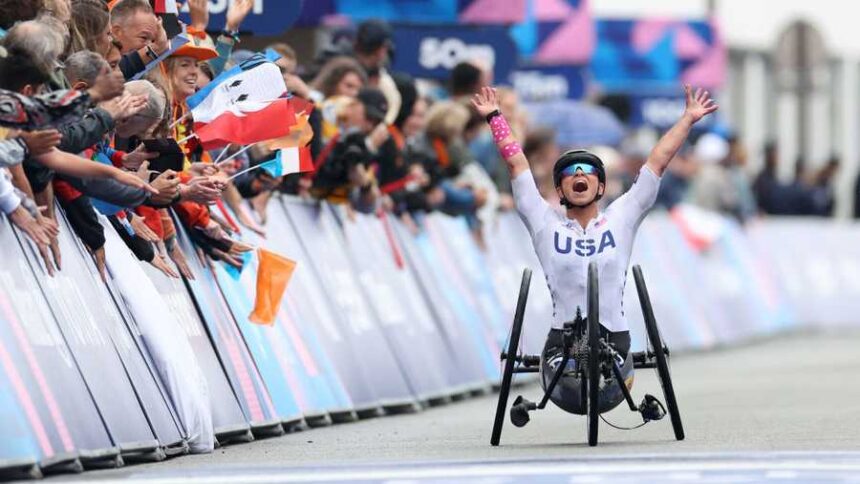As 2024 draws to a close, many of us will be hoping for a healthy bonus to help ring in the New Year. Elite athletes are no different.
Many gold medalists from this year’s Olympics in Paris will be enjoying vast bonuses and gifts in reward for their athletic achievements. However, a CNN Sport analysis has found that many of their Paralympic colleagues are being paid less to the tune of hundreds of thousands of dollars.
In many countries, National Olympic and Paralympic committees (NOCs and NPCs, respectively) and governing bodies are separate entities and govern their respective sports differently than their counterparts. For example, the United States has one body – the US Olympic and Paralympic Committee (USOPC) – while Australia has two – the Australian Olympic Committee and Paralympics Australia. Similarly, World Athletics and World Para Athletics are distinct bodies governing able-bodied track and field and para track and field respectively.
Many NOCs and NPCs are funded through government support and private sources through sponsorship and rights, such as Spain’s. Some, like Great Britain or China, receive a majority of government funding along with other sources (e.g. a national lottery). Others, such as the USOPC, are nonprofit corporations, which have no government funding at all and are reliant on both private investment and the generosity of the population of the country (e.g. the USOPC’s direct fan donation scheme).
CNN reached out to Olympic and Paralympic authorities from every nation competing at this year’s Games in Paris – some like Great Britain prohibit or do not allow awards to be given to athletes – and sourced data from reliable local reporting where available. At least 42 countries awarded gold medalists over $100,000 after the Paris Olympics, meanwhile, only 23 countries and Taiwan awarded their Paralympic champions bonuses of this size.
“Looking across the world, it is very disappointing that nations place such a varying importance on the funding of their athletes and that the profile and opportunity for para-athletes is often overlooked,” Sarah Storey, Great Britain’s most successful ever Paralympic athlete, told CNN Sport.
Singapore’s Paralympic champions earn a bonus of 500,000 Singapore Dollars (around $385,000), the largest figure of any country. However, this is half the sum awarded to Olympic champions.
Paralympic gold medalists from Hong Kong are awarded HK$1.5 million (around $190,000). While generous, it is 75% smaller than the bonus given to Olympic gold medalists from the city state. Silver Olympic medalists are given considerably larger bonuses – HK$3 million (around $386,000) – than gold Paralympic medalists from Hong Kong.
The Vietnamese Olympic Committee reportedly pledged a $1 million bonus to any athlete who won a gold medal at the Paris Olympics. Prospective Paralympic gold medalists from Vietnam were given an incentive of a little over 1% of their Olympic colleagues, at just 400 million Vietnamese dong (around $15,700) – the highest discrepancy identified by CNN.
CNN reached out to the Hong Kong Paralympic Committee, Vietnamese Paralympic Committee and Singapore National Paralympic Committee for comment but has not heard back.
Of the 205 nations and territories competing at Paris 2024, CNN identified at least 74 nations that allow prize money for their Olympic champions, only 30 of which award Olympic and Paralympic champions equal bonuses. CNN was only able to identify 55 countries where prize money was pledged to Paralympic medalists. There are at least 10 nations – including Great Britain, Bangladesh, Iceland, Norway and Yemen – that don’t offer financial rewards to either Olympic or Paralympic gold medalists.
On top of the rewards provided to medalists by individual nations and Olympic bodies, World Athletics (WA) provides gold medalists in Olympic track and field events $50,000 in prize money. This isn’t the case for Paralympic gold medalists.
When reached by CNN, World Para Athletics (WPA) said in a statement: “While World Para Athletics is not in a position to offer prize money in Para athletics events at the moment, we encourage investment in our sport and look forward to the day when we can engage in discussions about how we can reward our amazing athletes.”
World Para Athletics also emphasized to CNN that, while WA had 48 medal events at Paris 2024, WPA had 164 medal events at the Paralympic Games in the City of Light, highlighting the additional hurdle of providing funding for over triple the amount of events.
Despite that, nine-time British Paralympic gold medalist Hannah Cockroft told Sky Sports that the discrepancy was “frustrating” and called for parity.
“It’s tough seeing the Olympic guys get the money from World Athletics and then we can’t replicate, it’s frustrating” she told the British broadcaster. “That would really pay for my wedding quite well. Ultimately, I do this because I love it. We want parity and that’s what we push for every time.”
Ian Brittain, an academic at Coventry University and an expert in the study of Paralympic sport, told CNN that the differences in rewards “clearly sends a message of ‘less than.’”
Brittain added the differential between Paralympic and Olympic champions “reinforces much of the other systemic and structural discrimination disabled people encounter on a daily basis that makes their lives both more difficult and more expensive than most non-disabled people.”
Such an approach, he added, rewards disabled athletes “less than a non-disabled person when their achievements were probably both more expensive to them personally and harder to achieve given the barriers (environmental and attitudinal) they have had to overcome to reach that level.”


Leave a Reply